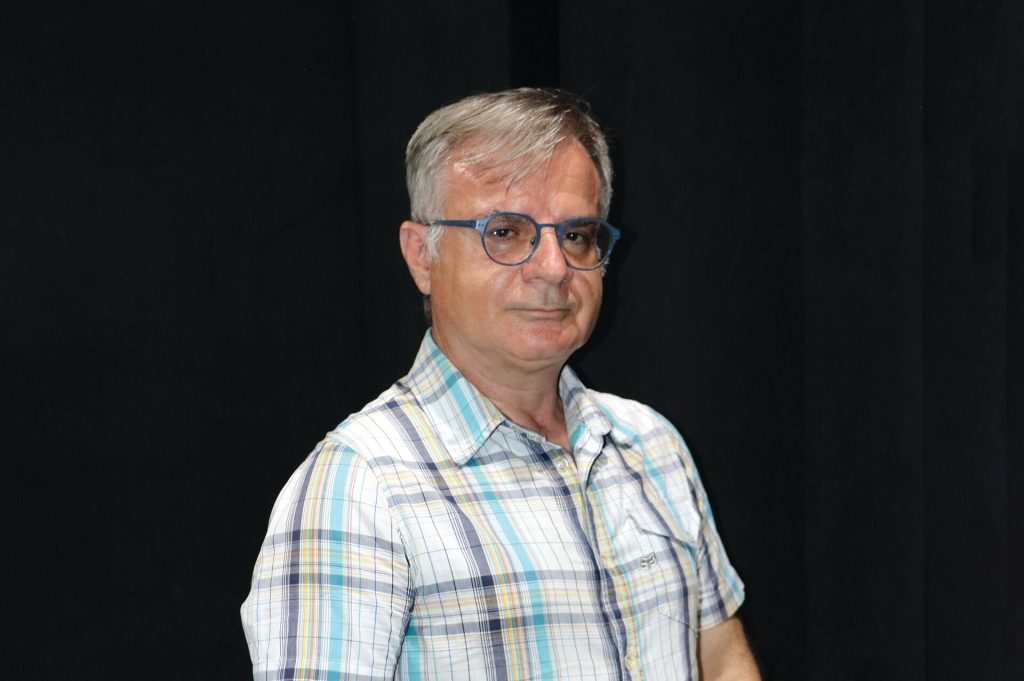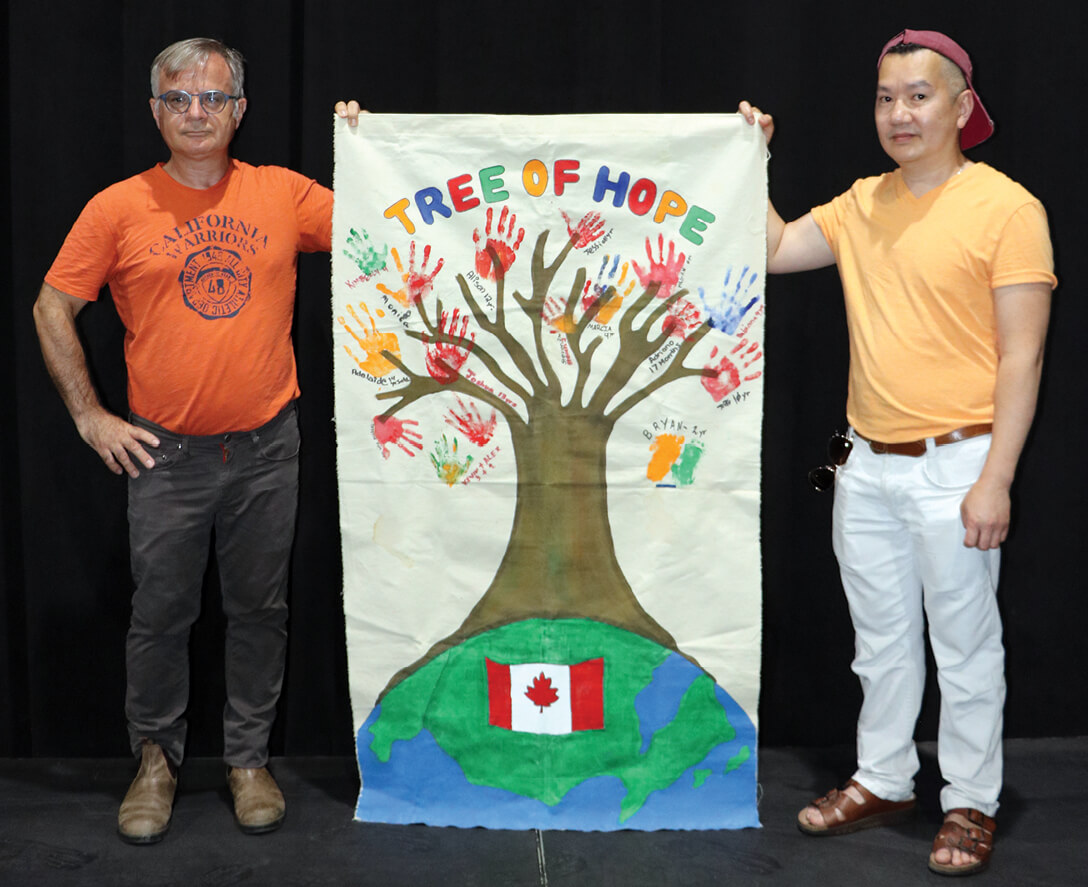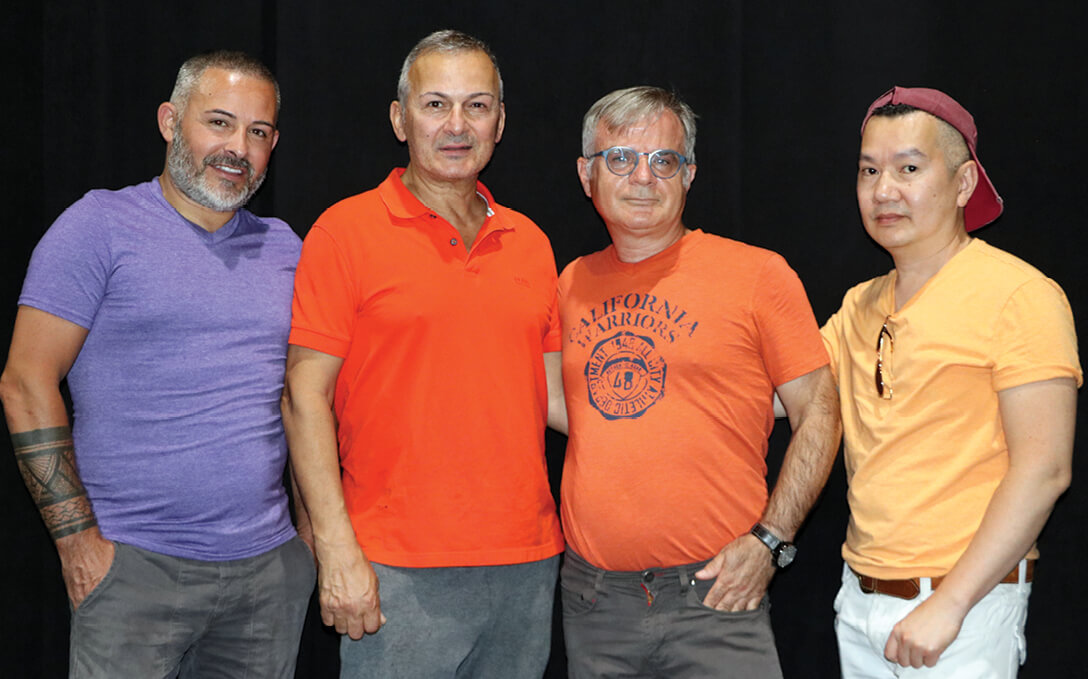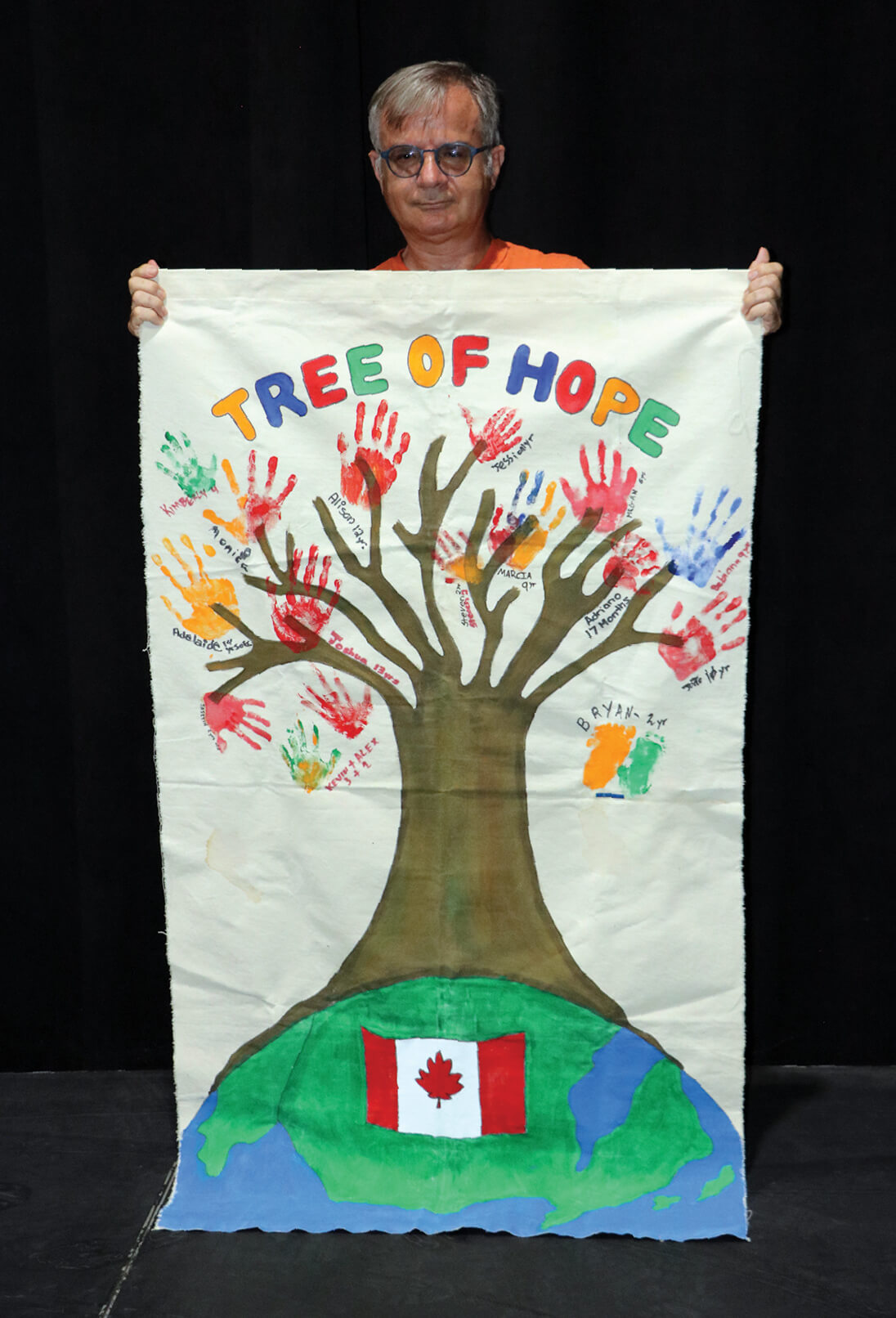À conversa com José Dias
"There’s a lot more hidden poverty then we really know"
José Dias was born in 1963 on the Portuguese island of Terceira (part of the Azores archipelago). His mother, Eufrosina, was from the island of São Jorge, Açores and his father, Manuel, from main land Portugal.
Born sixth of eleven children, José is from a humble background. He lost his mother when he was only 10 years old which sent him and his younger sisters to live in an orphanage. An earthquake which struck the island on January 1, 1980 caused severe damage across Terceira, including the orphanages where José and his sisters were housed.
In 1981 José moved to Canada and met his father in London, Ontario. After three months unsuccessfully looking for work, he moved to Toronto with only $50 in his pocket.
José’s life experiences led him to dedicate himself to the most vulnerable groups in the GTA—for over three decades he has worked as a social worker and caregiver, supporting the young and the elderly.
Recently, José crossed paths with his long-time friend Luis de Castro, and together they started a program with the support from MDC Media Group, that donates 25 hot meals every week to people who need help. Some of the meals, are delivered to José’s palliative clients and their grieving families and to people with disabilities.
As Ontario moves to Phase 2 of the Covid-19 regulations, it is time to do some math. We look back and to our present process of recovery. Unquestionably, this pandemic affected the seniors the most, however the crisis ended up revealing a lot more than we could have expected, exposing health, social and governmental issues that demand urgent change. In a conversation for Here’s the Thing (airing on Camões TV), Manuel DaCosta welcomes José Dias to discuss these issues.

Revista Amar: Tell us a little bit more about the type of work that you have done and do.
José Dias: I am a social worker by background, so I have been working with communities for many decades, since I came to Canada, in 1981. My passion has been always to help people… Initially I got in nursing but then I found that social work is my passion and I focused mainly in seniors. Over the years I did lots of work with seniors with dementia as well with elder abuse and focused more on mental health. I loved the work with seniors with mental health and I did it for more or less 10 years. Then I shifted into palliative care, which is more or less my area of specialty now and has a big interest to me. In the Portuguese community, I have been very vocal throughout the decades and one person comes to mind: Doctor Mário Silva. Going back to the nineties, we started a movement to help a Portuguese individual that had a mental illness, schizophrenia, and he was about to be deported. So, through some of the work that I did and Doctor Silva, who was just starting his political career, we were able to bring the community together and we went to the streets of Toronto and mobilize the community but not just that, we were able to make the Portuguese government to address the issue of deportation, in particular people with mental illness, HIV and AIDS, because these individuals, back then, would be deported from Canada or USA and would be left in the streets of Portugal and become homeless. So, through our activities the government decided to collaborate and now they have many programs for deported positive individuals and there will be a crew at the airport in Portugal to receive and housing them. I also did a support group for Portuguese men who were HIV positive because, a few decades back, it was a quite a stigma to address the HIV and AIDS… they didn’t have any support, so I supported them… is one of the things that I really loved to do. Another passion is to work with people with disabilities. This is the kind of work that I´ve been doing. I have always been into community activism in the Portuguese community and also in the Canadian context. I’m focused on undocumented children with disabilities, for that I’m on to do a master’s degree and I was a board member at DCI, Defense for Children International, in a national and international level, and my focus was on refugees and undocumented children… here I worked with undocumented families with undocumented children. I do home care and I love it the most… it’s a privilege to be able to enter in someone’s home and I’ve learned a quite a bit from them and I’m a better man because of this experience… you actually see people for what they are. There is no facade! And then you try to make a difference, whether you try to help them with financial support, housing support or at the end of life.
RA: Do you work for a government or a private organization?
JD: It’s a private organization. Initially the Home Care sector was in the hands of the government but, going back a few decades, when Mike Harris was Primer of Ontario he changed and privatized the Home Care program as we know. I began in a Hospital, Bridgepoint , but then they decided not to engage in direct community care and now I’m with a private company. It has been a learning experience for me – to have been in the private sector and now in the public sector… the clientele and the intervention are the same.
RA: What kind of individuals really have the ability to embrace this kind of career such as you have?
JD: Well, being a caregiver has been a natural thing for me, based on my personal experience with my family dynamics. I was very close to my mom and she died when I was 10 years old. But before she died, I was actually the person in the family feeding her and brushing her hair, making sure that she was comfortable… I really didn’t know what was happening to her, but then I realized that that was the end… but I was always a person that likes to make sure that you are feed, clothed and housed with the family. It’s a natural thing to me. I think that we all have the capacity to help. Some of us may help by feeding and caring directly, and some people may be able to just open the door and facilitate the process of engagement in making life easier for someone else.
RA: How hard is it to do this kind of work?
JD: I don’t see it as a hard job… I see it as a human being, helping out a human being. We all have a responsibility to make life easier. What happens is that some people, for whatever reason, may not be able to ask for and access resources. It can be a person with a disability, intellectual, physical or mental condition, or combination, or someone like a senior. If there’s someone like me who has no issue coming to your door and the person says “listen I need these resources, do you have them available?”, then there are no conflicts. It’s not hard for me to do that at all and over the years I have enjoyed collaborating with different partners because it takes all kinds of individuals to make home care successful. (…) We all need to be engaged.
RA: We are in the midst of a pandemic and we have seen the number of deaths that have happened, especially in long-term care facilities. Why wasn’t this problem brought to the forefront before, so we could prevent such tragedies?
JD: I think in some communities they are very engaged and assuring that the seniors are well taken care of… I could list the names, because I work with all of them. Some communities are a bit more passive, so they pass the responsibility on to the caregiver, the nurses, the doctors and so forth. The governments are in the business of regulating, but they’re not in the business of providing the day to day in care. So, what happens is that more resources were needed for healthcare, whether in institutions or home care. The previous government also acknowledge that, making changes to the Health Care System, so when the present government took over, they implemented some of these changes and some are on hold. I think that the society as a whole, we have acknowledged that this needed to happen. Then we were hit with the COVID-19. A lot of people didn’t expect this to happen and either did the seniors, but the governments should anticipate this kind of event, they should be prepared in the event something like this would happen and have the protective equipment for the health care providers. So, of course when they were hit with COVID-19 and those providers did not have the PPE, it affected them. (…) What we need to do? We need to have this kind of conversations and, in the right time, make these political individuals accountable and ensure that they plan. (…)
RA: How does the government help people who don’t have quite sufficient amounts of money to have people, like yourself, come in and take care of them?
JD: One thing that we know for a fact, the pensions aren’t capped… the person qualifies for CPP, which is a Canadian Pension Plan – the oldest security – and if the CPP is low, because they had a low paying job or they didn’t have enough contributions, then there is the supplement. The supplement will bring it up to a base line income for all seniors, but we do know that it’s not sufficient. So, I would say that probably 85% of the clientele that I have worked with, for more than 3 decades, in the Portuguese community, for example, cannot afford a retirement home. A retirement home in Toronto strikes at $2,400.00, and it’s not a high end, it’s just a very basic accommodation… because on a high end retirement home, we can go from $6,000.00 to $10,000.00 or more. So, we’re just talking about the average senior, they wouldn’t be able to afford a retirement home and that is a fact! The other thing the research indicates is that people preferred to stay at home as long as possible and, in fact, they would like to die at home, if it is an option for them. So, then what happens is if they don’t have the resources at home? The government provides a certain number of hours, but there is a cap in terms of how many hours of personal support, for workers to come in and give the person a shower, help with medications and offering very basic support to maintain the person’s independence at their home. Once the hours are exhausted at the end of the week, because there’s the cap, the person needs to pay privately. If the person is not able to pay privately, then it becomes a major problem and then the possibility of admission into a long-term care facility becomes the only alternative. The waiting list for a long-term care facility these days, is another issue, it can take up to five years in some of them.
RA: Do you find that families, because of societal pressure, work and everything else, are less and less engaged in the care of their senior parents?
JD: Traditionally the role of the caregiver has been that of the women, that is the reason the parents loved to have a daughter or a grand daughter so they could take care of them later in life. (…) It is true the society is different nowadays, but we also see some social differences from Portugal… we have the younger generation of Portuguese-Canadian that don’t communicate well with their parents in Portuguese, they may understand some Portuguese, but their main language is English and the parents then disengage. On the other hand, once the families realize that the parents are in a care facility, there’s a detachment, like the parents are no longer their responsibility and I think that’s totally wrong! The families need to be engaged and strong advocates… that’s why these long-term facilities don’t have a strong person advocating for the seniors, because if they had that maybe we have had prevented what happen when the Covid-19 hit.
RA: What about the senior abuse? And how high is it?
JD: Personally, I have asked some members of the community to tackle senior abuse… we see in the Portuguese community financial and physical abuse and neglect. And it’s very high… I’m not going to detail, but the cases have even increased, it’s a major problem! Actually, I have address different people from different organizations to tackle this as a social issue, because we have an obligation to do them. Yes, the financial and physical abuse and neglect is tremendous and I think we can do a better job…
RA: Is this an issue, like poverty, that is hidden from view so most people are not aware of it and they don’t realize what bigger problem it is?
JD: Well, yes… there is the stigma, right? There is also the fact that the senior is very quiet and afraid… it is very, very difficult! I have been in situations, where I was in a family setting and I was aware what was going on with the senior and I couldn’t disclose the information that I had, because I have to keep the senior’s safety… there is a level of trust, the senior trust you and if you betray that trust everything else falls apart.
RA: Does the youth in the Portuguese community still suffers from lack of education, by not completing higher grades? Is this still prevalent out there?
JD: Yes, it is… and studies indicate 3 groups that are systematical at the same level and they are: the Vietnamese, Portuguese and black communities that have the lows levels of education and the highest drop out. There are some programs that have been implemented to help these young people to achieve the grades and complete High School. However, the issue that I have with some of these programs is that they become a closed system… it’s good to have a system, but it’s important to have an evaluation to see what works and what doesn’t work… and if it doesn’t work, then changes are needed to be introduced, because without changes the outcome is going to be always the same.
RA: The lack of the education, in a way, can’t be faulted for everything, but it has something to do with the possible increase in the lack of understanding the seniors and how to take care of them… I thought that by now we would see some improvement, but obviously we still have a long way to go…
JD: Yes, we have… even recently, when we donated some food to seniors that are vulnerable, isolated and with disabilities like, for instant, at Casa dos Açores there are seniors with high level of dementia who are going to the center, that many of their families don’t have the skills to deal with dementia, and that’s why the aggression’s, the neglect, the verbal, emotional and physiological abuse begins to happen, because they don’t really understand that there is a dysfunction in the brain that needs to be treated medically.
RA: Because we are talking about the Portuguese community, how much poverty is there in our community?
JD: Some… we do have really poor families in our community.
RA: This pandemic has caused an increase of about 500% in usage of food banks. What does that say about our society? Is there more poverty hidden that we didn’t know?
JD: Sure, there’s a lot more hidden poverty then we really know…that’s one of the facts! And another is, we need to make our politicians accountable and really engage. We vote for them every four years. I tell my clients to speak to them when they come to their doors. Make sure to say “I’m giving you a vote. What are you doing for me?” It is quite significant, the fact that the Rogers Center was turned in a storage for the food bank, is telling all Canadians that we have a major problem coming and I think it’s everyone’s responsibility to participate, to engage, by volunteering, by asking for help, to collect and to give.
RA: When Luis de Castro, brought us, Cristina Da Costa and myself, the program of food distribution – cooking and giving away 25 meals a week – we immediately jump on board. I know it sounds a small number, but our attitude has always been “start with one and build from there” and I think this program is great and people seem to appreciate the food that has been deliver to them by volunteers. How do you identify the people that need this kind of help, for instance this 25?
JD: First of all, we all have one thing in common… we all need to eat in order to survive. I think who has more, should share with someone who has less. Honestly, I don’t pay attention on numbers, the main factor here is, I ask for help because there is an identified need, so whether I get help for 1 or 100, I’m okay and I appreciate what I get. Usually, I identify these people through past connections and collaborations, that in turn knows other people, that’s the beauty of sharing, of the social work. These particular 25 individuals, that welcomed the meals, some are palliative clients and their grieving families and some have disabilities. The most important thing is that at the end of the day, we made a difference in their lives. And going back, I have known Luis de Castro since we were teenagers. We met in Portugal before I came to Canada and he was my best friend here… we have gone through a lot together and it’s interesting because he went also in an area to making a contribution in social live and making a difference in a more “colorful” way… he is a very creative man. Now, that we have crossed paths again, we are collaborating together and this collaboration has taken a very positive turned.
RA: We live in a city, in society and we are part of the world… I’ve been of the opinion that if we could feed the hungry, we could eliminate lots of wars and lots of heartache, because I thing that a lot of it it’s because of downtrodden that haven’t be able to pick themselves up and sometimes it’s a little act of kindness that lifts people and, sometime, changes their ways, obviously not with seniors… but a campaign like this, that if it can be expanded and controlled with more people helping, I think that’s what it is about.
JD: Absolutely, and for the month of July I’m already planning an ice cream day for children. We already have identified the children and they will have ice cream, hot dogs and a task, but we need collaborators. We also identified a particular school from which the students could benefit from this day. That’s a positive thing.
RA: What do you think something is missing in the Portuguese community?
JD: I thing that the community needs to create a foundation, like many other communities have, where you actually raise and apply for funds and then these funds are distributed to different organizations that are really doing good work and don’t have a problem to be accountable. I have an issue with agencies that become closed systems where nobody knows where the money goes… that becomes a major issue for the society as a whole and for me as a service provider trying to access the resources. Comparing the level of help between some communities, I have to tell you that our community seems to be a little resistant to give. Things, that I have noticed when I go to some communities asking for food or resources is that normally, whatever you ask – sometimes even money that will be allocated for food – these communities they give, with no questions asked… I know, because I have asked and they have it and they share. With our community the first question I get is “why do they need it?”. That’s an interesting approach. And the same happens in terms of religion, where in other religion it´s like a natural process and they give, and with us, Catholics, there are always questions.
RA: I think it’s a cultural “thing”, but Thursday we are again cook and delivering another 25 meals and hopefully, who knows, maybe this can be expanded a little bit. I’m very excited to continue with it, even if it is only a small difference I think it’s worthwhile the effort.
JD: Of course, it’s an excellent idea and if there are more collaborations from companies that can make donations, it’s not about numbers but the intention, it would make a difference. When we present a hot meal to a senior that has been isolated for 3 months without going out… it’s emotional.
RA: It must be rewarding and heartbreaking to see their reaction, they haven’t been outside and haven’t, probably, seen a really good cook meal for 3 months.
JD: That and the fact that they didn’t have any human touch in 3 months as well, because when the pandemic hit, many of the services that they were receiving, like the personal care, where placed on hold and they didn’t have really the family contact as well.
RA: How much physiological do you have to do in addition to everything else?
JD: Well, I do it because I believe I make a difference and I believe that the more I give the more I get back. I have been very pleased with my work, with what I have done and received… but I also believe that before I’m finished, I need to tackle the senior abuse in the community, and we all need to tackle this… it’s a very uncomfortable topic! In Portugal it’s the same thing, it does happen and it’s a major problem. We need to seat at a table and have this uncomfortable conversation. We can’t forget that if we have done well – I did well! – it’s because of these seniors, that have paved the way for immigrants like me, like us. Why shouldn’t I do this for them now, when they don’t have anyone to speak for them?
RA: We are quite privileged that we are in a position and to be able to help. This is not about just giving, but more about helping. However, on the other hand, our community is aging and we are trying, right now, to build our first seniors long-term care facility and assisted living and we are at the stage where we have the permits, the land and the non-profit designations… we have everything but the funds and now we have to test the fundraising capacity of the community that never built something of this magnitude… it will be interesting to see, how the community will react when we come asking for help… but do you thing we will succeed?
JD: I thing we will succeed, although the Portuguese community doesn’t give as easily as other communities and without questioning, but still there is potential and I think there are enough resource in our community to make this happen and I also think they want a long-term facility and a retirement home. (…) I really think the Portuguese are ready for this.
RA: Well, the feedback has been very positive, but the question is always, knowing our cultural “inclinations”, will our community build a project that everybody can be proud of and where we can incorporate our culture into the building to make of it a center for the Portuguese community? I think it’s time that we have something of this nature… we worked very hard to get it to this point and I’m very positive, but now we need the community to step up to the plate!
JD: Absolutely… and there is a question of safety. A person is free to make decisions and take the risk by staying home, but the ability to make this decisions diminishes as the risks increases… that´s why the admission on a long-term care facility becomes an option, whether or not those options are exercised by the family or by the medical team that eventually will do. I can see the long-term care facility and assisted living in the community working together, because you can get all the partners involved if you make a facility as the focal point that interacts with the community where all the generations can come and socialize with the seniors and that is good for the seniors, good for Pre Schools, good for High Schools and so on. We know, through researches, that the Portuguese as they get older they feel more comfortable speaking in Portuguese and if they have dementia or Alzheimer they reverse back to the mother tongue, so I think if I would develop dementia in the future most likely I will speak only in Portuguese and, of course, I want to be taken cared by a Portuguese speaking person, that understands me and my culture.
RA: I like to think we live in a prosperous country, although recent studies showed statistics pointing out that 33% of children of Toronto go to school without food and the percentage is higher in adults. Breakfast Clubs at schools, Food Banks, Shelters and so on, are trying to help but don’t seem to be able to keep up. Poverty affects people’s self-worth and then they feel shame and I think that’s one of the main barriers for them to ask for help.
JD: It´s true. People are very humble for being poor and they don’t like to ask for help. (…)
RA: Does the Portuguese community have enough resources to assist our seniors?
JD: We do have a problem with the language, but there is also a lack of personal support workers in general, and as society we need more and I think the government is in conversations on recruiting more personal support workers. It´s a very hard job and we have acknowledged know, with the pandemic, that we haven’t paid them enough. We can’t expect that they look after our loved ones for minimum wage, without protections. Also, as a Portuguese society we should approach the politicians and talk about the needs we have in our community… we shouldn’t be embarrassed at all by sitting at the table with the politicians and tell them that we need nurses or personal support workers from Portugal… the other communities do that!!!
RA: I would like to congratulate you for the work that you have done and do. And also thank you for introducing your work and the new program, cooking and deliver food to the needier, that we certainly will continue. Cristina DaCosta, Rosa Bandeira, Madalena Balça and Carmo Monteiro already cooked and for this week we are already planning. Hopefully, we are going to start a movement and get more people involved.
JD: I thank you for this opportunity.
Entrevista conduzida por Manuel DaCosta
Transcrição: Carmo Monteiro e Telma Pinguelo







Redes Sociais - Comentários